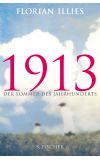
22 Jul 2013 01:20:53
It's the year that Charlie Chaplin signs his first movie contract and Louis Armstrong picks up a trumpet. In New York, the first edition of Vanity Fair is published, and in Essen, the first Aldi supermarket opens its doors. But "the capital of modern age anno 1913" is Vienna, and its "star players" the likes of Freud, Schnitzler, Schiele, Klimt, Loos, Wittgenstein and Kokoschka: "Here the battles raged: about the unconscious, about dreams, the new music, the new way of seeing, the new architecture, the new logic, the new morality." Illies imagines Stalin and Hitler tipping their hats in polite greeting as they stroll through the same city park in January, Tito's in town, too: but at this stage in the play of history they're just "three extras, or non-speaking parts".
Grand epoch-defining moments like the May premiere of The Rite of Spring are juxtaposed with minor, mundane details about a coffee between friends, but Illies's genius turn of phrase, beautifully retained by Shaun Whiteside and Jamie Lee Searle's elegant translation, can be found throughout. July holidays are spoilt by bad weather. "Constant rain. Everyone goes half-mad in their hotel rooms. But still: Matisse brings Picasso a bunch of flowers." The entries read like history's footnotes, but as anyone who's read Freud knows, the footnotes always tell the best story.

